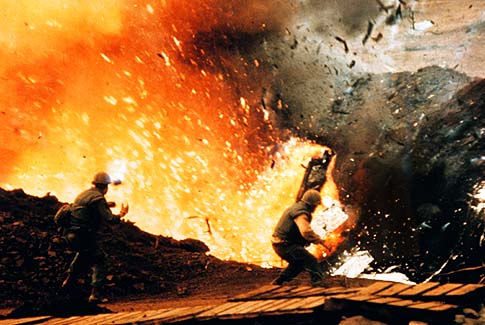 |
R E Q U I E M ROBERT ELLISON
An ammunition dump struck
by a shell explodes in front of U.S. Marines.
|
| Khe Sanh was the biggest ruse
of the war. General William Westmoreland was convinced that the Vietnamese
Communists would attempt another Dien Bien Phu against the garrison of
six thousand Marines he had placed as bait at this forlorn spot in the
far northwest corner of South Vietnam. When they did, he was going to squash
them in triumph. But, as explained by General Hoang Phuong, the Vietnamese
chief of military history, whom I met in Hanoi after the war, "General
Westmoreland fell into a strategic ambush."
The Vietnamese gave every appearance of threatening Khe Sanh, surrounding the place with thousands of troops and shelling the base relentlessly. No serious attempt to seize the Marine base ever occurred. The Vietnamese purpose was to distract Westmoreland's attention from their preparations for the real Dien Bien Phu of the American war, the surprise nationwide offensive at Tet, the lunar New Year holiday, in January 1968, which broke the will of the Johnson administration and of the American public to continue to prosecute the conflict. The ruse succeeded completely. On the first morning of the Tet offensive, Westmoreland announced that the panorama of attacks across South Vietnam, including an assault on the U.S. embassy in the middle of Saigon, was merely a diversion from an intended main thrust at Khe Sanh and across the demilitarized zone. Yet the credulity of the commanding general cannot detract from the staunchness of the Marines who held Khe Sanh, at the cost of 205 of their comrades, and the gallantry of the aviators who kept them supplied with food and ammunition. (Neil Sheehan) One of the casualties of Khe Sanh was photographer
Robert Ellison.
|
|